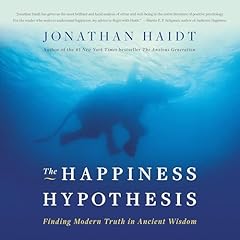
Who's in Charge?
Free Will and the Science of the Brain
No se pudo agregar al carrito
Add to Cart failed.
Error al Agregar a Lista de Deseos.
Error al eliminar de la lista de deseos.
Error al añadir a tu biblioteca
Error al seguir el podcast
Error al dejar de seguir el podcast
 Exclusivo para miembros Prime: ¿Nuevo en Audible? Obtén 2 audiolibros gratis con tu prueba.
Exclusivo para miembros Prime: ¿Nuevo en Audible? Obtén 2 audiolibros gratis con tu prueba.Compra ahora por $19.10
-
Narrado por:
-
Pete Larkin
The father of cognitive neuroscience and author of Human offers a provocative argument against the common belief that our lives are wholly determined by physical processes and we are therefore not responsible for our actions.
A powerful orthodoxy in the study of the brain has taken hold in recent years: Since physical laws govern the physical world and our own brains are part of that world, physical laws therefore govern our behavior and even our conscious selves. Free will is meaningless, goes the mantra; we live in a “determined” world.
Not so, argues the renowned neuroscientist Michael S. Gazzaniga in this thoughtful, provocative book based on his Gifford Lectures - one of the foremost lecture series in the world dealing with religion, science, and philosophy. Who's in Charge? proposes that the mind, which is somehow generated by the physical processes of the brain, “constrains” the brain just as cars are constrained by the traffic they create. Writing with what Steven Pinker has called “his trademark wit and lack of pretension”, Gazzaniga shows how determinism immeasurably weakens our views of human responsibility; it allows a murderer to argue, in effect, “It wasn’t me who did it - it was my brain.” Gazzaniga convincingly argues that even given the latest insights into the physical mechanisms of the mind, there is an undeniable human reality: We are responsible agents who should be held accountable for our actions, because responsibility is found in how people interact, not in brains.
An extraordinary book that ranges across neuroscience, psychology, ethics, and the law with a light touch but profound implications, Who’s in Charge? is a lasting contribution from one of the leading thinkers of our time.
©2011 Michael S. Gazzaniga (P)2011 TantorLos oyentes también disfrutaron:




















Reseñas de la Crítica
Las personas que vieron esto también vieron:
















Needs more detail but good
Se ha producido un error. Vuelve a intentarlo dentro de unos minutos.
You Didn't Do It Alone?
Se ha producido un error. Vuelve a intentarlo dentro de unos minutos.
Very insightful.
Se ha producido un error. Vuelve a intentarlo dentro de unos minutos.
What did you love best about Who's in Charge??
Plain English in a field of in penetrable jargonWhich character – as performed by Pete Larkin – was your favorite?
Non fiction, no charactersIf you were to make a film of this book, what would be the tag line be?
A film of the mindInformative and generally comprehendable
Se ha producido un error. Vuelve a intentarlo dentro de unos minutos.
Very enjoyable narration and thought provoking
Se ha producido un error. Vuelve a intentarlo dentro de unos minutos.


